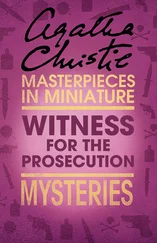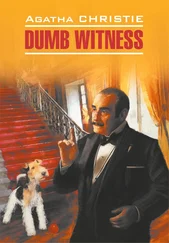Agatha Christie - Dumb Witness
Здесь есть возможность читать онлайн «Agatha Christie - Dumb Witness» весь текст электронной книги совершенно бесплатно (целиком полную версию без сокращений). В некоторых случаях можно слушать аудио, скачать через торрент в формате fb2 и присутствует краткое содержание. Жанр: Классический детектив, на английском языке. Описание произведения, (предисловие) а так же отзывы посетителей доступны на портале библиотеки ЛибКат.
- Название:Dumb Witness
- Автор:
- Жанр:
- Год:неизвестен
- ISBN:нет данных
- Рейтинг книги:5 / 5. Голосов: 1
-
Избранное:Добавить в избранное
- Отзывы:
-
Ваша оценка:
- 100
- 1
- 2
- 3
- 4
- 5
Dumb Witness: краткое содержание, описание и аннотация
Предлагаем к чтению аннотацию, описание, краткое содержание или предисловие (зависит от того, что написал сам автор книги «Dumb Witness»). Если вы не нашли необходимую информацию о книге — напишите в комментариях, мы постараемся отыскать её.
Dumb Witness — читать онлайн бесплатно полную книгу (весь текст) целиком
Ниже представлен текст книги, разбитый по страницам. Система сохранения места последней прочитанной страницы, позволяет с удобством читать онлайн бесплатно книгу «Dumb Witness», без необходимости каждый раз заново искать на чём Вы остановились. Поставьте закладку, и сможете в любой момент перейти на страницу, на которой закончили чтение.
Интервал:
Закладка:
I grasped the receiver tightly.
"What is it?"
"She left the Wellington, you know – Bella, I mean. I went there late in the afternoon yesterday and they said she'd left. Without a word to me, either! Most extraordinary! It makes me feel that perhaps, after all, Dr Tanios was right. He spoke so nicely about her and seemed so distressed, and now it really looks as though he were right after all."
"But what's happened. Miss Lawson? Is it just that Mrs Tanios left the hotel without telling you?"
"Oh, no, it's not that! Oh, dear me, no. If that were all it would be quite all right. Though I do think it was odd, you know. Dr Tanios did say that he was afraid she wasn't quite – not quite – if you know what I mean. Persecution mania, he called it."
"Yes." (Damn the woman!) "But what's happened?"
"Oh, dear – it is terrible. Died in her sleep. An overdose of some sleeping stuff! And those poor little children! It all seems so dreadfully sad! I've done nothing but cry since I heard."
"How did you hear? Tell me all about it."
Out of the tail of my eye I noticed that Poirot had stopped opening his letters. He was listening to my side of the conversation. I did not like to cede my place to him. If I did it seemed highly probable that Miss Lawson would start with lamentations all over again.
"They rang me up. From the hotel. The Coniston it's called. It seems they found my name and address in her bag. Oh, dear, M. Poirot – Captain Hastings, I mean – isn't it terrible? Those poor little children left motherless."
"Look here," I said. "Are you sure it's an accident? They didn't think it could be suicide?"
"Oh, what a dreadful idea, Captain Hastings! Oh, dear, I don't know, I'm sure. Do you think it could be? That would be dreadful! Of course she did seem very depressed. But she needn't have been. I mean there wouldn't have been any difficulty about money. I was going to share with her – indeed I was! Dear Miss Arundell would have wished it. I'm sure of that! It seems so awful to think of her taking her own life – but perhaps she didn't… The hotel people seemed to think it was an accident."
"What did she take?"
"One of those sleeping things. Veronal, I think. No, chloral. Yes, that was it. Chloral. Oh, dear. Captain Hastings, do you think -"
Unceremoniously I banged down the receiver.
I turned to Poirot.
"Mrs Tanios -"
He raised a hand.
"Yes, yes, I know what you are going to say. She is dead, is she not?"
"Yes. Overdose of sleeping-draught. Chloral."
Poirot got up.
"Come, Hastings, we must go there at once."
"Is this what you feared – last night? When you said you were always nervous towards the end of a case?"
"I feared another death – yes."
Poirot's face was set and stern. We said very little as we drove towards Euston. Once or twice Poirot shook his head.
I said timidly:
"You don't think -? Could it be an accident?"
"No, Hastings – no. It was not an accident."
"How on earth did he find out where she had gone?"
Poirot only shook his head without replying.
The Coniston was an unsavoury-looking place quite near Euston station. Poirot, with his card, and a suddenly bullying manner, soon fought his way into the manager's office.
The facts were quite simple. Mrs Peters, as she had called herself, and her two children had arrived about half-past twelve. They had had lunch at one o'clock. At four o'clock a man had arrived with a note for Mrs Peters. The note had been sent up to her. A few minutes later she had come down with the two children and a suitcase. The children had then left with the visitor. Mrs Peters had gone to the office and explained that she should only want the one room after all.
She had not appeared exceptionally distressed or upset, indeed she had seemed quite calm and collected. She had had dinner about seven-thirty and had gone to her room soon afterwards.
On calling her in the morning the chambermaid had found her dead.
A doctor had been sent for and had pronounced her to have been dead for some hours. An empty glass was found on the table by the bed. It seemed fairly obvious that she had taken a sleeping-draught, and, by mistake, taken an overdose. Chloral hydrate, the doctor said, was a somewhat uncertain drug.
There were no indications of suicide. No letter had been left. Searching for means of notifying her relations. Miss Lawson's name and address had been found and she had been communicated with by telephone.
Poirot asked if anything had been found in the way of letters or papers. The letter, for instance, brought by the man who had called for the children.
No papers of any kind had been found, the man said, but there was a pile of charred paper on the hearth.
Poirot nodded thoughtfully.
As far as any one could say, Mrs Peters had had no visitors and no one had come to her room – with the solitary exception of the man who had called for the two children.
I questioned the porter myself as to his appearance, but the man was very vague. A man of medium height – he thought fair-haired – rather military build – of somewhat nondescript appearance. No, he was positive the man had no beard.
"It wasn't Tanios," I murmured to Poirot.
"My dear Hastings! Do you really believe that Mrs Tanios, after all the trouble she was taking to get the children away from their father, would quite meekly hand them over to him without the least fuss or protest? Ah, that, no!"
"Then who was the man?"
"Clearly it was some one in whom Mrs Tanios had confidence or rather it was someone sent by a third person in whom Mrs Tanios had confidence."
"A man of medium height," I mused.
"You need hardly trouble yourself about his appearance, Hastings. I am quite sure that the man who actually called for the children was some quite unimportant personage. The real agent kept himself in the background!"
"And the note was from this third person?"
"Yes."
"Some one in whom Mrs Tanios had confidence?"
"Obviously."
"And the note is now burnt?"
"Yes, she was instructed to burn it."
"What about that resume of the case that you gave her?"
Poirot's face looked unusually grim.
"That, too, is burned. But that does not matter!"
"No?"
"No. For you see – it is all in the head of Hercule Poirot."
He took me by the arm.
"Come, Hastings, let us leave here. Our concern is not with the dead but with the living. It is with them I have to deal."
Chapter 29
INQUEST AT LITTLEGREEN HOUSE
It was eleven o'clock the following morning.
Seven people were assembled at Littlegreen House.
Hercule Poirot stood by the mantelpiece. Charles and Theresa Arundell were on the sofa, Charles on the arm of it with his hand on Theresa's shoulder. Dr Tanios sat in a grandfather chair. His eyes were red-rimmed and he wore a black band round his arm.
On an upright chair by a round table sat the owner of the house, Miss Lawson. She, too, had red eyes. Her hair was even untidier than usual. Dr Donaldson sat directly facing Poirot. His face was quite expressionless. My interest quickened as I looked at each face in turn.
In the course of my association with Poirot I had assisted at many such a scene. A little company of people, all outwardly composed with well-bred masks for faces. And I had seen Poirot strip the mask from one face and show it for what it was – the face of a killer!
Yes, there was no doubt of it. One of these people was a murderer! But which? Even now I was not sure.
Poirot cleared his throat – a little pompously as was his habit – and began to speak.
"We are assembled here, ladies and gentlemen, to inquire into the death of Emily Arundell on the first of May last. There are four possibilities – that she died naturally – that she died as the result of an accident – that she took her own life – or lastly that she met her death at the hands of some person known or unknown.
Читать дальшеИнтервал:
Закладка:
Похожие книги на «Dumb Witness»
Представляем Вашему вниманию похожие книги на «Dumb Witness» списком для выбора. Мы отобрали схожую по названию и смыслу литературу в надежде предоставить читателям больше вариантов отыскать новые, интересные, ещё непрочитанные произведения.
Обсуждение, отзывы о книге «Dumb Witness» и просто собственные мнения читателей. Оставьте ваши комментарии, напишите, что Вы думаете о произведении, его смысле или главных героях. Укажите что конкретно понравилось, а что нет, и почему Вы так считаете.












